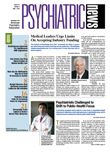New legislation—described as the next step in comprehensive health reform—is designed to quadruple the number of community health centers nationwide.
Rep. James Clyburn (D-S.C.), the House majority whip, introduced a bill (HR 1296) in March to provide $26 billion for a huge increase in community health centers beyond the 1,067 existing centers. These centers operate 6,700 clinics that provide dental and medical care, including mental health services, to about 16 million low-income and uninsured individuals.
Among those clinics are approximately 3,000 that provide community-based mental health care.
“This is the next step to comprehensive and universal health care for all of our citizens,” Clyburn said in a statement.
The legislation would increase the $2.1 billion annual spending on community health centers to $8 billion over five years.
The legislation also would provide more than $1 billion for the National Health Service Corps, a program for physicians who practice in low-income communities in exchange for scholarships and forgiveness of medical school debt.
The legislation does not mandate that a specific percentage of health centers provide particular types of care—such as treatment for psychiatric illness—only that applying treatment facilities meet federal qualifications, which include providing treatment for “medically underserved” people.
Sen. Bernie Sanders (I-Vt.), who introduced similar legislation (S 486) in the Senate, said additional community health centers are needed to provide care to the 56 million Americans—including some who have health insurance—who cannot find a physician or allied health professional to treat them in a timely manner. This results in many people seeking expensive care in an emergency department or going untreated and incurring greater costs to the system when a deteriorating condition requires hospitalization.
He pointed out that the health centers' cost-effective approach to care has created support for them across party lines, as seen in the bipartisan support his legislation has attracted.
“The reason for that bipartisan support is that everybody here understands that community health centers provide quality health care in a cost-effective manner,” Sanders said.
Sanders praised new funding for such health centers included in the recently passed stimulus measure—the American Recovery and Reinvestment Act (ARRA, PL 111-5)—which provided $155 million to support 126 new health centers. His legislation would build on these newly approved health centers.
“The construction and expansion of health centers will create thousands of new jobs, help provide health care to an estimated 750,000 Americans across the country who wouldn't have access to care without these centers, and take another step toward an affordable, accessible health care system,” Sanders said in a written statement.
The bipartisan support for the legislation and the senior positions of both primary sponsors indicate a positive outlook for the legislation.
The community health center bills can be accessed at<http://thomas.loc.gov> by searching on bill numbers, HR 1296 and S 486. ▪
